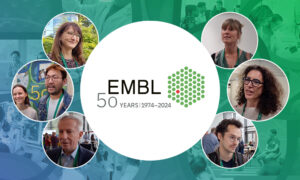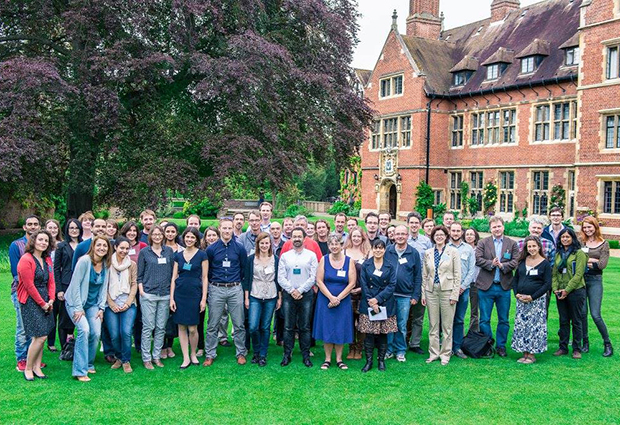
Read the latest Issue
More than 70 UK-resident alumni and their networks connected on 23 May at Cambridge University’s Trinity Hall College, where inspiring projects were presented by a cross-section of EMBL alumni speakers. We caught up with two of them to find out more

 Abel Ureta-Vidal
Abel Ureta-VidalThen: Project leader EMBL-EBI (2001–07)
Now: Co-founder, Eagle Genomics
“The skills you develop as a scientist – patience, persistence and resilience in the face of setbacks and failures – are fundamental to entrepreneurship,” says Abel Ureta-Vidal, co-founder of Eagle Genomics “My aim was to join a big company for a change of scene, but I ended up starting my own,” says Ureta-Vidal, who moved on from EMBL-EBI to industry by way of the Judge Business School at the University of Cambridge.
“Starting your own business is about mindset: believing you can do it, seeing it like a job and jumping into it. When I started I knew nothing about business. I’d done my PhD and worked in bioinformatics, a trendy field, but I didn’t have the tools to start a company.”
Location played no small part in Ureta-Vidal’s career change. “Here in Cambridge, you can do both academic and commercial research, and you get a lot of exposure to entrepreneurs, start-ups, role models,” he says. “That is so valuable – if you don’t have this kind of environment, you won’t see the possibilities that may be open to you.”
Ureta-Vidal worked on the Ensembl genomic data resource for six years before acting as a consultant. He then joined forces with Eagle Genomics co-founder Will Spooner and grew the company from there. Eagle Genomics brings profound domain knowledge to big-data projects, not just solving problems for companies by creating technologies to prepare data for machine-learning, but empowering them to find their own way. “We work on the premise that our clients are not looking for a drill, but they’re trying to make a hole,” he explains. “They don’t want to ‘do big data,’ or machine learning, but they want to reposition drugs, or identify the neutral microbiome so they can create a winning product.”
Collaborations between start-ups and academia can be tricky because the legal environment is complex, but there is a lot to be gained from informal interactions, says Ureta-Vidal whose company moved to the Wellcome Genome Campus this summer.
“You shouldn’t worry too much about giving your ideas away,” he says. “There is so much more to making something profitable – you should worry more about whether you’re up for a lot of hard work, and learning some very hard lessons about risk, collaborations and IP.” Ureta-Vidal believes all scientists should receive basic business education and gain hands on experience. His top advice to budding entrepreneurs? “Start earlier than I did, when it’s not so hard to take risks, and don’t ever get too comfortable. You’ve got to prepare for the next step.”
So what’s the next step for Ureta-Vidal? “After eight years, I am looking into new possibilities,” he smiles. “I’m finally able to step back and watch the company function on its own. That is something I’m really proud of.”
 Louise Modis
Louise Modis Then: EMBL PhD student (1995–9)
Now: Scientific Director, Immunology Network, GSK
EMBL alumna Louise Modis is a driving force in GSK’s Immunology Network, a fresh take on commercial-academic collaboration. “Bridging the gap between ideas and discovery is what we’re trying to do, and that takes challenging one another more,” says Modis, whose experience as an EMBL PhD student brought home the importance of defending questions rigorously. “We can’t do it without an interdisciplinary community because there’s only so much any one of us can know.”
Modis is actively involved in the GSK Immunology Network, which provides a new way for researchers working in companies and academic settings to collaborate.
“After leaving EMBL I assumed I’d only be able to find the kind of collaborative, questioning environment I’d enjoyed so much at EMBL at an academic institute. But I have found such an environment throughout my experience in the sector – first at Millennium Pharmaceuticals, then at Boehringer Ingelheim Pharmaceuticals, and now at GSK,” she says.
At the May 2016 EMBL Alumni event in Cambridge, Modis stressed the importance of gaining experience in both commercial and academic sectors. For example, the Immunology Network features a sabbatical programme (the Immunology Catalyst) at GSK where researchers with big ideas can spend a percentage of their time, benefiting from GSK’s science, resources and technologies to pursue interesting questions in ways they couldn’t easily achieve in their academic labs.
“Being co-located makes a huge difference because it’s so much easier for people to keep asking each other tough questions, which makes the research better,” says Modis. “At EMBL it was easy to ask, ‘Why not?’ We were working together constantly in this creative and collaborative environment, and it was taken as read that we were working towards a common goal.”
Industry needs more ‘constructive disruptors’, says Modis, to achieve breakthroughs. “The immunology network is pre-competitive, and provides a way for researchers with very different styles and approaches to work on innovative ideas in the same physical space,” she adds. “That’s how we’re going to achieve breakthroughs that lead to better-designed medicines, and solutions that make a difference in people’s lives.”
Looking for past print editions of EMBLetc.? Browse our archive, going back 20 years.
EMBLetc. archive